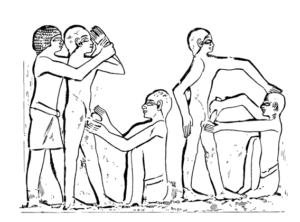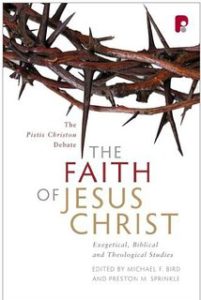From Philippians 1-4
 Paul rejects the Jewish law and considers his former life in it rubbish. He keenly desires the resurrection. By way of his own example he encourages the Philippians to adopt the same attitude and lifestyle in pursuing resurrection from the dead.
Paul rejects the Jewish law and considers his former life in it rubbish. He keenly desires the resurrection. By way of his own example he encourages the Philippians to adopt the same attitude and lifestyle in pursuing resurrection from the dead.
This post is part of my bible in a year series.
Passage and Comments
In today’s passage Paul warns the Philippians (who are doing quite well in Paul’s opinion) of a group of people who are ‘the circumcision’. They were a bunch of Jews (possibly believers) who thought the Gentile believers should be circumcised and observe the Jewish law (cf. Gal 2.12; Tit 1.10).
2 Look out for the dogs, look out for the evildoers, look out for those who mutilate the flesh. 3 For we are the circumcision, who worship by the Spirit of God and glory in Christ Jesus and put no confidence in the flesh (Php 3.2–3)
‘Look out’. Paul doesn’t hold back on his insults of these people calling them ‘dogs’ and ‘evildoers’. The Jews had a bit of a pecking order of which of Gods creations were more highly esteemed. Dogs were near the bottom, as they were considered an unclean animal.

‘Mutilate the flesh’. Paul uses similar expressions several times in our passage (Phil 3.3,4). The following context suggests Paul refers to the act of circumcision.
From the Jewish point of view, circumcision was commanded as a sign used to identify the covenant people of God (Gen 17.10-15) in contrast to the pagans.
‘We are the circumcision’. Paul by way of contrast refers to himself and believers as ‘the circumcision’.
By saying ‘we are the circumcision’ Paul is effectively saying we are the true members of God’s covenant, not this other group who think they are.
‘Worship’ and ‘Glory’. Paul describes their way of life as believers in terms of their relationship towards God.
‘Confidence’. They put no confidence in the flesh. No confidence in the flesh for what? The immediate context suggests, they put no confidence in fleshly circumcision as the means by which they know they are the covenant people of God.
4 though I myself have reason for confidence in the flesh also. If anyone else thinks he has reason for confidence in the flesh, I have more: 5 circumcised on the eighth day, of the people of Israel, of the tribe of Benjamin, a Hebrew of Hebrews; as to the law, a Pharisee; 6 as to zeal, a persecutor of the church; as to righteousness under the law, blameless. (Php 3.4-6)
‘I have reason for confidence in the flesh’. Paul rattles off his credentials as a Jew. They all relate to Judaism. Some specifically to his ethnic descent (‘people of Israel’, ‘tribe of Benjamin’, ‘Hebrew of Hebrews’). Others to his former role in society (‘Pharisee’, ‘Persecutor of the church’). Lastly his obedience to God’s commands in the law of Moses (‘righteousness under the law’, ‘blameless’).
‘Righteousness under the law, blameless’. Blameless doesn’t mean he was sinless and perfect. Rather it means he kept the law which includes the sacrifices for atonement and forgiveness.
From the Jewish point of view these were not the best, but pretty good. The only improvement would be if he was born into the tribe of Judah.
But all this changed because of Jesus.
7 But whatever gain I had, I counted as loss for the sake of Christ. 8 Indeed, I count everything as loss because of the surpassing worth of knowing Christ Jesus my Lord. For his sake I have suffered the loss of all things and count them as rubbish [lit. smelly poo], (Php 3.7-8a)
‘I counted as loss for the sake of Christ’. So now Paul has spelled out his credentials which gave him confidence he was one of God’s covenant.  He says he now considers it all be a great heap of smelly poo.
He says he now considers it all be a great heap of smelly poo.
In fact, he regards everything as smelly poo compared to the value of knowing Christ. Everything pales in significance to knowing Jesus his Lord. This is the most important thing in his life. More than everything else.
What do you value most in your life?
Paul says ‘for his [Jesus’] sake he has suffered the loss of all things’. His former life as a Jew, his reputation, his wealth and security, his family and friends.
At some time in his life, Paul made a decision to trade all these up for Jesus. It seems the decision wasn’t a difficult one for Paul. For Paul, Jesus comes first.
He did all this…
in order that I may gain Christ 9 and be found in him
not having a righteousness of my own that comes from the law,
but that [a righteousness] which comes through the faithfulness of Christ,
the righteousness from God that depends on faith
10 that I may know him and the power of his resurrection, and may share his sufferings, becoming like him in his death,
11 that by any means possible I may attain the resurrection from the dead. (Php 3.8b-11)
I’ve coloured the outer statements is blue to help us see the context of what remains in black and hopefully shed light on it.
‘Gain Christ’. Paul wants to ‘gain Christ’. Paul means several special things by this. At the very least he refers to having a relationship with Christ.
‘Be found in him’. Paul wants to be ‘found in him’. To be found someone has to have been looking to see where he is. When Paul says he wants to be ‘found in him’ he uses corporate language. To be found as part of his group, his family, his nation and under his rule.
‘The law‘. When Paul refers to the ‘law’ he means the law of Moses and not good works. In no way here does he discourage the Philippians from good works. According to Paul, good works please God, bring future rewards (2 Cor 5.9-10) and are meant to be done to reap eternal life (Gal 6.7-10). He encourages good works several times in the letter (cf. Phil 1.5,11,27; 4.5-9,15).
‘Comes from the law’. ‘Comes through faith’. Paul is referring to the source of ‘righteousness’. Where does ‘righteousness’ come from? What does Paul mean by ‘righteousness’?
‘A righteousness of my own that comes from the law’. Paul before described his credentials which he formerly believed established him as part of God’s covenant people (‘the circumcision’). This is what he is referring to as ‘a righteousness of my own’.
If one looks up a biblical dictionary, a persons ‘righteousness’ normally refers to their right way of living. For the Jews this refers to their daily practice of all God’s commands in the old covenant, the law of Moses (cf. Dt 6.25 ‘righteousness for us’). These were both obligatory for the Jews and marked them out as God’s covenant people. Paul’s use of the expression not only refers to his blameless obedience to the law of Moses, hence ‘from the law’, but also his family connections to the people of Israel.
 ‘The righteousness which comes through the faithfulness of Christ’. I’ll explain the right way of living Paul refers to here a little later. You might notice I’ve changed what the ESV text says here so let me explain. The phrase ‘faith in Christ’ could also be rendered ‘the faithfulness of Christ’. As it is in the NET and KJV translations. The Greek word πίστις or pistis can be translated as ‘faith’ or ‘faithfulness’. Is Paul referring to believers having faith in Christ? Is he referring to the faithfulness of Christ unto death (cf. Gal 2.21; Phil 2.8)?
‘The righteousness which comes through the faithfulness of Christ’. I’ll explain the right way of living Paul refers to here a little later. You might notice I’ve changed what the ESV text says here so let me explain. The phrase ‘faith in Christ’ could also be rendered ‘the faithfulness of Christ’. As it is in the NET and KJV translations. The Greek word πίστις or pistis can be translated as ‘faith’ or ‘faithfulness’. Is Paul referring to believers having faith in Christ? Is he referring to the faithfulness of Christ unto death (cf. Gal 2.21; Phil 2.8)?
“The construction “faith of Christ” is ambiguous in Greek. Two questions emerge regarding it, one semantic and the other syntactical.
The first is the meaning of the word “faith.” The second is the precise meaning of the genitive Greek construction “of Christ.” Regarding the meaning of the word “faith,” the tension is between the semantically objective meaning (trust) and the semantically subjective meaning (faithfulness).
Both are attested in Scripture (objective, Rom 4:9; subjective, Rom 3:3).
Normally Paul meant “faithfulness” when the word was a quality of “God” or “Christ,” as it is here. The syntactical question is the nature of the statement “of Christ.” It could mean belonging to Christ, produced by Christ, directed to Christ, or simply of Christ. Most likely, it is the faithfulness which is in Christ and should be read “of Christ.”
This first statement, therefore, appears to mean that righteousness is made available to people through the faithfulness of Christ.” (Melick, R. R. (1991). Philippians, Colossians, Philemon (Vol. 32, p. 134). Nashville: Broadman & Holman Publishers.)
‘Depends on faith’. This righteousness from God ‘depends on faith’. It’s all linked to ‘faith’ – this time to the faith of believers. It probably refers to a mix of their faith in Christ and faithfulness towards him because the two cannot be separated.
 I believe Paul’s meaning of the expression ‘righteousness from God‘ can be better understood by realising Paul is contrasting two different lifestyles which the two groups believed marked out the covenant people of God (v2 ‘the circumcision’).
I believe Paul’s meaning of the expression ‘righteousness from God‘ can be better understood by realising Paul is contrasting two different lifestyles which the two groups believed marked out the covenant people of God (v2 ‘the circumcision’).
The first which was in Judaism, and the second, the right way of living – the righteousness – which Paul so keenly desires.
‘That I may know him and the power of his resurrection’. To ‘gain Christ‘, to be ‘found in him‘, ‘to know Christ‘ and to ‘know the power of his resurrection’ (cf. Eph 1.19-20), ‘to share in his sufferings’, and ‘to become like him in his death’.
Paul no longer seeks the righteousness of his own that comes from the law of Moses. By this he means a lifestyle consisting of obedience to the law of Moses.
Rather the ‘righteousness from God’ Paul seeks is a life powered by God and which imitates Christ’s cruciform life – Christ’s suffering and death. Which on Paul’s part depends on his persevering trust and faithfulness.
 ‘By any means possible I may attain the resurrection from the dead’. Living like Christ is the means to this glorious end. Resurrection from the dead.
‘By any means possible I may attain the resurrection from the dead’. Living like Christ is the means to this glorious end. Resurrection from the dead.
Of course Paul has not already fully attained these things. He may know Christ, but he stumbles and sins, he is still learning and growing in relationship with God. He has experienced the power of the Spirit in his life, but has not yet been raised from the dead by the Spirit (cf. Rom 8.11).
12 Not that I have already obtained this or am already perfect, but I press on to make it my own, because Christ Jesus has made me his own. 13 Brothers, I do not consider that I have made it my own. But one thing I do: forgetting what lies behind and straining forward to what lies ahead, (Phil 3.12-13)
‘Perfect’. Resurrection is the perfection of people and Paul has not been resurrected yet. Knowing this Paul presses on to make it his own. He does this because Christ Jesus has made him one of his people.
Paul ‘forgets what lies behind’ him. He is referring to his former lifestyle. The Jews were aware of God’s promises and were striving to attain resurrection from the dead. The Jews did it by remaining faithful to the law God gave them. Paul once did this, but now Paul considers this way rubbish.
Unlike most Jews in his time, Paul connected Jesus’ life, death and resurrection to the promises of God and the Jewish hope of resurrection (Acts 13:32–33; 24:14–16; 26:4–8). Paul is still striving for resurrection from the dead, but he has dumped the former manner in which he pursued it (Php 3.4-8).
14 I press on toward the goal for the prize of the upward call of God in Christ Jesus. (Php 3.14)
‘Goal’, ‘Prize’, ‘Call’. Paul uses a well known example of running a race as an analogy. How everyone understands how races work applies to Paul’s understanding here.
God’s calling (the word κλήσεως Trans. klēseōs can also be translated as ‘summons’, ‘invites’) alludes both the initiation of their relationship (belonging to Christ) and summoning them towards the end goal and purpose of that relationship (resurrection).
Importantly there is running the race as well. God’s call (summons) does not guarantee they will receive the prize. Rather all have to run with purpose according to the rules or they may be disqualified (1 Cor 9.24-27).
The prize is given because they run the race. The analogy and the references to prize highlights the notion of merit. Everyone understands runners don’t receive the prize because they are called to be runners or because they are summoned to the finish line. They receive the prize (reward) because they run the race according to the rules.
(Note: Some might say even before they run the race they are guaranteed to win, so they don’t win because they run the race, but for some other reason. This is what people call ‘cheating’ and Paul doesn’t mean that here.)
Paul strives after the goal of resurrection by believing in Christ, remaining faithful to him, straining forward and in all things pressing on towards the goal. According to Paul, Christian faith involves much effort and suffering. But the end goal is resurrection.
For Believers

Paul concludes this short passage encouraging the Philippians to have the same mindset.
15 Let those of us who are mature think this way, and if in anything you think otherwise, God will reveal that also to you. 16 Only let us hold true to what we have attained. (Php 3.15-16)
The same mindset is to refuse go back to the Jewish way of seeking resurrection. Getting circumcised and adopting the law of Moses. Rather, Paul encourages us to seek and know Christ. Under the sovereignty of God this may mean suffering and death. But the end goal of our faith and striving is resurrection from the dead.
Copyright © Joshua Washington and thescripturesays, 2014. All Rights Reserved.


